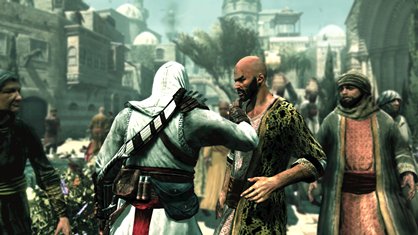Short circuit
Getting to the long and the short of shrinking games
Ultimately, content should determine length, rather than the other way around. This was a mantra that the BioShock team kept in mind. “We did not arbitrarily add content to inflate our game’s length,” says Gardner. “It’s a sin to create a generic, repetitive experience just so you can write ‘Over 40 hours of gameplay’ on the box.”

Above: You could plow through Assassin's Creed in about 8 hours... but why rush the plot along when you can enjoy sightseeing and stabbing peasants for at least another 10?
Despite a few miffed punters, who wanted more Bio-bang for their buck, it is worth remembering that the game dwarfed System Shock 2 in content. “Putting aside all the polish and custom events, the sheer size of BioShock’s maps are probably twice the size of SS2,” continues Gardner. “We knew early on that we wanted to make a much faster, more intense experience than SS2. This meant that the spaces had to be much larger to support the combats. To put it simply, the fights with the Big Daddies would not have been possible on the Von Braun.”
Perhaps the biggest concern over shrinking games surrounds RPGs. Where are the 100-hour RPGs of yore? MMOs come to the rescue here: “Tabula Rasa has a couple of hundred hours of baseline content if you are just running to reach the initial level cap of level 50,” says Garriott. “Plus every few weeks we add more content, more missions, more maps, more features, so it is growing all the time.”
Ultimately, we should get what we expect from a game, according to its genre. From a puzzle, racing or sports game: unlimited replayability. From a shooter: multiple hours of rip-roaring action. From RPGs: weeks of glazy-eyed stat-boosting. From The Sims: the usual load of micromanaging bollocks. It’s all about quality of content, as Bill Gardner says. And a full-price game should rightfully have more quality content than any other medium out there.
Mar 3, 2008
Weekly digests, tales from the communities you love, and more


